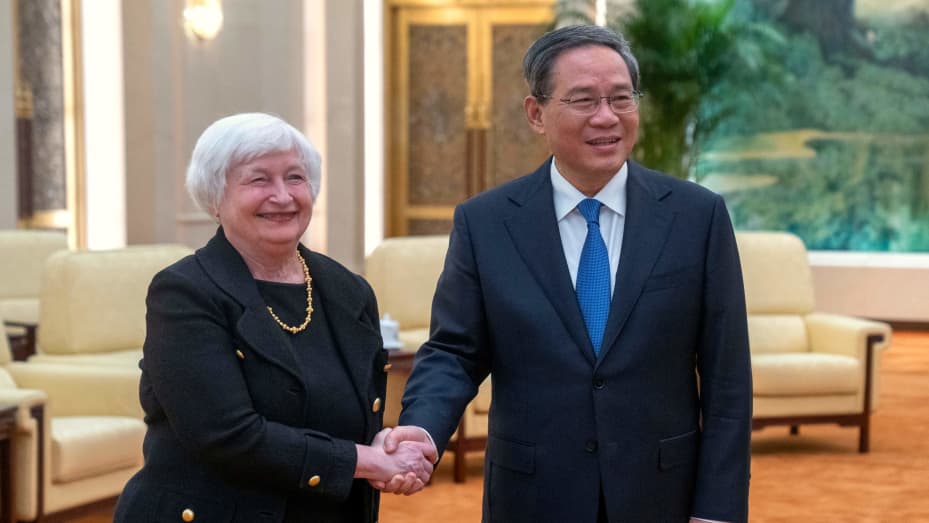Diplomatic Truce Between Washington and Beijing
The Usual Troubles
According to Iran Gate, U.S. Treasury Secretary Janet Yellen arrived in Beijing on Thursday, June 6, for an official four-day visit. During this trip, she is expected to meet with senior Chinese officials and American companies operating in the country. It is anticipated that she will meet with prominent Chinese figures, including Premier Li Qiang and Finance Minister Liu Kun.
However, a meeting between Janet Yellen and President Xi Jinping is not anticipated. This visit follows U.S. Secretary of State Antony Blinken’s trip a few weeks ago and adds to the list of efforts to reduce tensions between the two global giants.
In fact, Yellen’s mission had a rocky start, and from the initial leaked statements, there is no sign of easing tensions or improving relations. In her speech at the American Chamber of Commerce in Beijing, Yellen expressed concern about the restrictions announced by the Chinese government earlier this week.
In reality, Beijing has announced that starting from August 1, it will restrict the export of products and materials containing gallium and germanium, which are rare and critical metals for semiconductors, 5G network stations, and solar panels, to protect its national security and interests.
She expressed concern over the punitive actions of the Chinese government against American companies and spoke about unfair economic practices. These actions seem to be retaliatory measures against U.S. restrictions on the sale of chips and advanced manufacturing equipment and are expected to be used as leverage in future negotiations between the two countries. At the end of May, Beijing effectively removed Micron’s microchips from its market. Additionally, the new anti-espionage law that took effect last Saturday, which imposes stricter regulations aimed at national security, will impose significant restrictions on American companies.
On the other hand, Washington will certainly not just sit back and watch. The Biden administration, which has retained the tariffs introduced by Trump, is apparently considering countermeasures, including restrictions on the sale of chips and access to cloud services for Chinese companies. According to Janet Yellen, although these measures speak of limited national security objectives, they exacerbate the already tense economic and political environment.
Healthy Competition
Therefore, it is no coincidence that Yellen emphasizes the importance of flexible and diverse supply chains. However, she clarified that the U.S. does not aim to decouple from China’s economy, and both countries would benefit from healthy economic competition. This message reflects the idea of creating a relatively solid foundation for relations between the two countries to prevent further deterioration, an idea discussed by the two presidents in their meeting last November.
Pragmatism in Beijing
During her visit, Janet Yellen will meet with senior Chinese executives and American companies operating in the country. Her trip to China, despite the restrictions announced by the Chinese government regarding rare metals, is a positive sign.
Her mission comes a few days after Joe Biden, despite all efforts to improve relations and reduce tensions between the two countries, called the Chinese president a dictator, a remark that reignited tensions and risked freezing relations between the two superpowers again. However, Beijing, understanding that the U.S. president is in an election campaign and needs to confront his Republican rivals, considered pragmatism but still intends to respond to the technological challenge.
Yellen Was the Federal Reserve Chair
Yellen’s mission is followed by Commerce Secretary Gina Raimondo. The resumption of talks should be sealed with a bilateral agreement between Biden and Xi Jinping on the sidelines of the G20 summit in India in September or the APEC summit in San Francisco in November. The Treasury Secretary, who knows China well since her time as the Federal Reserve Chair, is perceived as a friendlier counterpart compared to other members of the Biden administration.
To the extent that she has previously supported reducing U.S. tariffs, even if she later had to make tough decisions, her tone has always been mild, and she believes that the relationship between Washington and Beijing is important for the entire world.
Currently, both the U.S. and Chinese governments are caught in a spiral of mutual disagreements, and it seems that neither is willing to take the first step towards de-escalation. This vicious cycle shows no sign of stopping at present.
English
View this article in English

